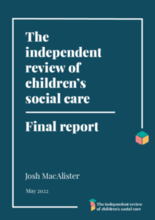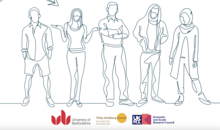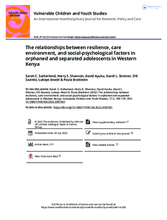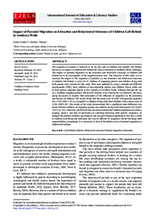Displaying 1831 - 1840 of 14579
On 02 May 2022, a range of stakeholders from the child care and protection area will gather in Brussels to discuss the need for trauma-informed practices as part of the “Safe Places, Thriving Children” final project even
This report is a culmination of an independent review of the UK's care system in order to build recommendations for how the system can be improved and to continue feeding in a wide range of views. The work and outcomes of the review were guided by the views of people that have lived experience of the children’s social care system in the UK.
This briefing paper draws on data and findings from the Insights into the World of Privatized Faith-Based Residential Care Facilities in Myanmar research report.
This briefing paper draws on data and findings from the Insights into the World of Privatized Faith-Based Residential Care Facilities in Myanmar research report.
The Care Leavers, COVID-19 and Transition from Care (CCTC) study explored how COVID-19 impacted on care leavers’ lives and their pathways out of care; examining where young people went, what services and support they received, and how young people got on.
This study focused on Israeli care leavers a decade after leaving care and explored various factors associated with satisfaction with both intimate relationships and parenthood.
This study found a strong relationship between the care environment and resilience in orphaned and separated adolescents and youths (OSAY) in western Kenya. Care environment and resilience each independently demonstrated strong relationships with peer support, social support, and participating in volunteer activities. Resilience also had a strong relationship with familial support. These data suggest that resilience can be developed through strategic supports to this vulnerable population.
South Korea experienced international scrutiny over its irregular intercountry adoption practices in the 1980s. However, it eventually came to be viewed as a model of transparent and efficient adoptions. This façade disguises an orphan adoption system that has become entrenched over the decades. Today, adoptees continue to lobby for their right to origins. This paper explores South Korea’s laws and policies, which nullified the rights of adoptees, and it calls for receiving countries to assume co-responsibility to restore these rights.
The migration of parents is believed to be for the sake of children and families left behind. However, its impact on children left behind has been overlooked in Southern Wollo, Ethioipia. The impact of parental migration on the education and behavioral outcomes of children left behind has to be investigated in the migration-prone area. The objective of this study was to examine the impact of the migration of parent(s) on the education and behavioral outcomes of children left behind.







